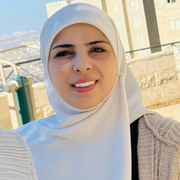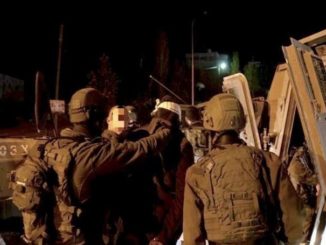
Maher al-Akhras and Khader Adnan were close friends. The latter died last May while on a hunger strike. The former continues with the struggle.
Once again, Taghreed al-Akhras found herself in the same unenviable position. Once she almost lost her hunger-striking husband, Maher, while in Israeli prison. History seems to be repeating itself.
Maher Al-Akhras, 52, was still suffering from the effects of his previous hunger strike when he started another strike as his only weapon against the Israeli policy of administrative detention.
Detained without Hope
This type of detention is routinely imposed by Israel against Palestinian detainees. Its roots date back to the so-called British Mandate In Palestine. Israeli courts, however, continue to use it to this day, despite constant criticism by international rights groups and legal institutions.
The administrative detention is not based on specific charges, but rather on a ‘secret file’ that even the Palestinian prisoners’ lawyers are prohibited from seeing. Without knowing the accusation or charge, the work of the lawyer becomes irrelevant to the legal procedures, whatever they are.
Administrative detention is imposed for various periods, up to six months. But it is often renewed upon its expiration. In some cases, it can rob several years from a Palestinian prisoner’s life keeping him isolated, imprisoned, and not knowing what the future holds.
‘My Family, My People’: How Khader Adnan Unified Palestinians from His Prison Cell
‘I Declare Hunger Strike’
On July 27, 2020, al-Akhras decided to go on a hunger strike to block his administrative detention. This is a means used by administrative detainees to confront Israel’s intransigence and its refusal to end or limit the detention period despite its violation of international law.
Al-Akhras’s strike continued for four months, during which the prisoner lost a massive amount of weight and his health deteriorated significantly. However, eventually, he prevailed over administrative detention and gained his freedom after a few weeks.
On August 23, Israeli forces raided al-Akhras’s house in the village of Silat Al-Dhahr, south of Jenin, and arrested him yet once again.
His wife, Taghreed, told The Palestine Chronicle that her husband shouted at the top of his lungs that he was starting a hunger strike and would not end it until he was released.
“He was still receiving treatment for the effects of the previous strike. He suffered from health problems and was on special medications,” Taghreed told us.
“But when he was arrested, he immediately declared a new strike in rejection of Israeli oppression,” she continued.
Overall, al-Akhras was arrested six times and spent more than five years in Israeli prisons.
Taghreed explained that administrative detention is the worst type of detention, as there is no specific timeframe for the prisoner to wait, knowing that he or she will eventually return home.
Families too are left in suspense, waiting for their family member for months, or even years without even knowing anything about the fate of their beloved relatives.
“This time around, however, the Israeli prosecution filed an indictment against my husband, which included charges that he did not admit to. They were devoid of substance, so he decided to continue his strike,” she added.
‘I am Strong’
Israel prevented lawyers from visiting Al-Akhras, who is still detained in the notorious Al-Jalama interrogation center.
Not a Defeated People: On Baroud’s ‘These Chains Will Be Broken’
Taghreed went to his trial session last Sunday, September 10, though she was prohibited from even speaking to her husband.
“He looked tired. Exhaustion was clear on his face. He clearly lost a lot of weight, was unable to move, and his eyes and body were emaciated,” she explained.
Then, she said, “despite all of this, he smiled at me, mouthing that he was strong and would not back down.”
During the trial session, al-Akhras gathered his strength and told his lawyer that he had been subjected to a direct death threat from Israeli interrogators.
They told him that they would cause his death, as they did with Khader Adnan, who died during his hunger strike in an Israeli prison last May.
“Maher and Khader were close friends. They were like twins who never left each other’s side,” Tagreed remembers.
“Maher was deeply saddened by the loss of his friend. He still cries whenever he remembers Khader. For him, being on a hunger strike means continuing along Khader Adnan’s path and honoring his death,” she added.
However, Taghreed admits that, at times, she is overwhelmed by conflicting emotions.
“Anxiety consumes me; consumes us. But the continued threats by the Israeli soldiers did not break Maher’s morale. Khader’s spirit is accompanying him and giving him strength,” she told us.
Since May, Israel has been holding the body of Khader Adnan, refusing to hand it over to his family.
Since speaking to Taghreed, Al Akhras has chosen to suspend his hunger strike after 21 days in order to give his lawyer the opportunity to negotiate his freedom.
A trial will be held on October 26.
Unfortunately, Taghreed is not ruling out the possibility of her husband being forced to resume his hunger strike.
Israel’s Ultimate Objective
Maher is not the only one. Two Palestinian prisoners are still on hunger strike in protest against their administrative detention.
They are Kayed Al-Fasfus from Al-Khalil (Hebron) and Sultan Khalouf from Jenin. They have been on a hunger strike since August 3.
According to Palestinian institutional data, this year witnessed an unprecedented increase in the issuance of administrative detention orders, reaching 1,300 prisoners out of 5200 who are currently held in Israeli prisons.
This number of administrative detainees has not been recorded since the Second Intifada which broke out in 2000.
VIDEO: ‘These Chains Will Be Broken’: Delving into the Heart of Palestinian Resistance
Helmi al-Araj, the Director of the Center for Defending Civil Liberties and Civil Rights, told The Palestine Chronicle that this policy falls within the collective punishment practiced by Israel as a tool of deterrence.
According to al-Araj, Israel seeks, through arbitrary administrative detention, to strike the Palestinian national movement and weaken the resilience of the Palestinian people.
“The administrative detainee is arrested without charge or trial. This contradicts international law, which only allows this type of detention in extreme cases. For instance, if the person poses a direct and immediate danger,” al-Araj told us.
“However, Israel uses it against women, university students, activists, lecturers, journalists, and even children,” he added.

– Fayha’ Shalash is a Ramallah-based Palestinian journalist. She graduated from Birzeit University in 2008 and she has been working as a reporter and broadcaster ever since. Her articles appeared in several online publications. She contributed this article to The Palestine Chronicle.







